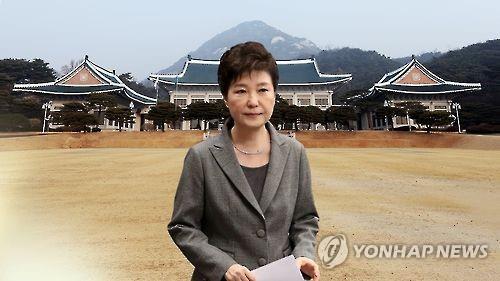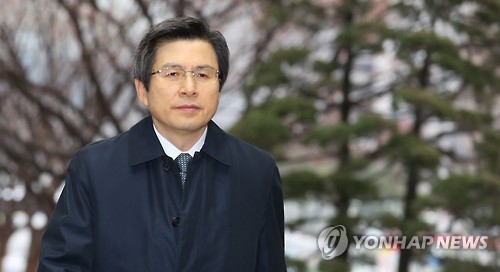- California Assembly OKs highest minimum wage in nation
- S. Korea unveils first graphic cigarette warnings
- US joins with South Korea, Japan in bid to deter North Korea
- LPGA golfer Chun In-gee finally back in action
- S. Korea won’t be top seed in final World Cup qualification round
- US men’s soccer misses 2nd straight Olympics
- US back on track in qualifying with 4-0 win over Guatemala
- High-intensity workout injuries spawn cottage industry
- CDC expands range of Zika mosquitoes into parts of Northeast
- Who knew? ‘The Walking Dead’ is helping families connect
Lack of presidential hopefuls drags down ruling Saenuri Party
SEOUL, Dec. 12 (Yonhap) — South Korea’s ruling Saenuri Party is suffering from a lack of qualified candidates who will run for the presidency, political pundits said Monday, amid a rising possibility that the next election will be held earlier than scheduled following the impeachment of President Park Geun-hye.
With conservative Saenuri figures falling behind liberal candidates in major polls, Park loyalists are even seeking to have Acting President and Prime Minister Hwang Kyo-ahn as the new contender for the party.
Last week, the National Assembly passed Park’s impeachment motion in a 234-56 vote over a scandal involving the president and her long-time confidante Choi Soon-sil. The legitimacy of the motion will be reviewed by the Constitutional Court, which may take up to 180 days.
Park’s five-year term is supposed to end in February 2018, with the presidential election scheduled for December next year. If the court gives a nod to Park’s ouster, however, South Korea will then have 60 days to pick a new leader.
As Park loyalists earlier suggested that the president voluntarily step down in April and the presidential race be held in June, political pundits said the troubled president is unlikely to complete her full term in any scenario.
Candidates from Saenuri have been nearly non-existent on major surveys on presidential hopefuls conducted by key pollsters.
In a survey released by Real Meter on Monday, Moon Jae-in, a former head of the main opposition Democratic Party, posted an approval rating of 23.1 percent last week, up 2.3 percentage points from a week earlier. The study was conducted on 2,517 South Koreans with a margin of error of plus or minus 2 percentage points.
Moon, who lost against Park in the previous presidential election, has been claiming that Park should immediately step down, while the president earlier said she will wait for the review by the top court.
U.N. Secretary-General Ban Ki-moon followed with 18.8 percent, down 0.1 percentage point over the cited period. Although Ban is not a Saenuri member, political pundits widely believe he will stand with the conservative bloc if he is to run for president.
Ban, however, has never expressed a clear stance on the rumors, only to say that he would “contemplate” his role as a South Korean citizen when he returns home.
Seongnam Mayor Lee Jae-myung, a member of the Democratic Party, followed at 16.2 percent, up 1.5 percentage points, marking an increase for the fourth-consecutive week. Lee, who had been standing as a minor candidate, recently emerged as a key contender after winning popularity through making intemperate remarks against the president.
Accordingly, none of the major figures cited as potential candidates were from Saenuri.
While Rep. Kim Moo-sung, former head of Saenuri, managed to be included in the top list months ago, the lawmaker said he will not run for presidency, adding he will instead focus on normalizing the party.
Rep. Yoo Seong-min and Oh Se-hoon, the former mayor of Seoul, are also cited as potential candidates from Saenuri, but their approval ratings hover around single digits.
Pundits said Saenuri will face struggles in coming up with a strategy for the upcoming presidential election, especially as the party’s approval rating is also losing ground.
Last week, the Democratic Party posted an approval rating of 35.9 percent, up 3.4 percentage points on-week. Saenuri, however, slipped 0.5 percentage point to 17.3 percent. The splinter People’s Party posted 12.3 percent, also down 3 percentage points.
Accordingly, pundits said it is crucial for the ruling party to come up with a figure that can bring conservative voters back together.
Park loyalists in Saenuri, meanwhile, are considering Hwang as an option.
Hwang, who may serve as the acting president for more than six months, has refrained from making remarks on his candidacy. When asked about the presidency earlier this year, months before the outbreak of the scandal, the prime minister said he will “vote” on election day, without making a direct answer.
Park loyalists believe Hwang may gather support from the public if he carries out state affairs successfully amid Park’s vacancy.
“Now is the time to consider every option,” a Park-loyalist lawmaker said. “The acting president is the No. 1 option, considering Ban has never actually made a vow to join us.”
“Hwang served as a justice minister and a prime minister under the conservative administration, proving his abundant experience,” the lawmaker also said, adding such a consensus is also shared by major party members.
Another Park loyalist echoed the view, but said Hwang first needs to prove his capabilities through his role as the acting president.
When South Korea’s National Assembly also passed an impeachment motion of late former president Roh Moo-hyun in 2004, which was later turned down by the top court, then-acting president Goh Kun also had emerged as a potential candidate.
Goh had been maintaining a considerable approval rating ahead of the 2007 presidential race, before he decided not to join.













